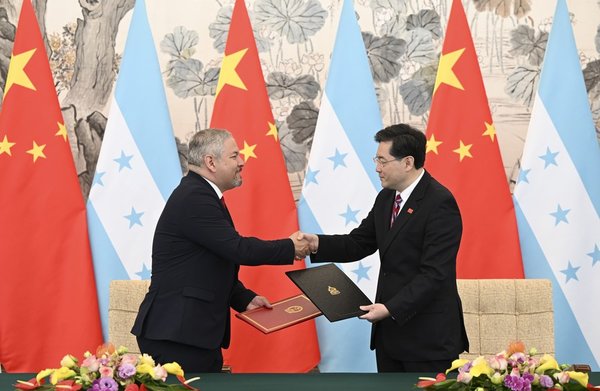Xiplomacy: Historic Meeting Guides Development of China-Honduras Relations
 |
| President of the Republic of Honduras Iris Xiomara Castro Sarmiento arrived in Shanghai on Friday morning, starting her China visit which will run until June 14 at the invitation of Chinese President Xi Jinping. [Xinhua/Gao Feng] |
After walking the red carpet China rolled out for her, visiting Honduran president Iris Xiomara Castro Sarmiento and Chinese President Xi Jinping conducted their historic meeting, jointly charting the course forward for bilateral relations.
BEIJING, June 14 (Xinhua) — Greeted by a group of frisky children clutching bouquets, Iris Xiomara Castro Sarmiento, president of the Republic of Honduras, broke into a smile and reciprocated the warm gestures by forming a heart shape with her hands. Standing beside her was Chinese President Xi Jinping.
It's a scene that would be inscribed in the chronicle of China-Honduras relations. After walking the red carpet China rolled out for the visiting Honduran president, the two heads of state conducted their historic meeting on Monday, jointly charting the course forward for bilateral relations.
New Chapter
Castro is the first Honduran president to pay a state visit to China. When she arrived in Shanghai on Friday, the president said her visit to China is expected by the Honduran people.
On March 26, China and Honduras signed a joint communique in Beijing on the establishment of diplomatic relations. Honduras has thus become the 182nd country to have diplomatic relations with China.
 |
| Chinese State Councilor and Foreign Minister Qin Gang and Honduran Foreign Minister Eduardo Reina shake hands after signing a joint communique on the establishment of diplomatic relations in Beijing, capital of China, March 26, 2023. [Xinhua/Zhang Ling] |
During the meeting, Xi said the bilateral relationship has got off to a good and speedy start and enjoys great dynamism and promise since the establishment of diplomatic ties.
Underscoring the immediate and long-term significance of the establishment of diplomatic ties, Xi stressed "China will remain committed to developing friendly relations with Honduras, firmly support economic and social development in Honduras, and forge a good friendship and partnership with Honduras featuring mutual respect, equality, mutual benefit, and common development."
China and Honduras have every reason to forge close ties. Recognized as a major developing country with a strong sense of responsibility, China has been dedicated to strengthening solidarity and cooperation among developing countries and safeguarding their common interests and international fairness and justice.
During their talks, Xi said that China is willing to work with Honduras and other Latin American and Caribbean (LAC) countries to promote cooperation on the China-CELAC Forum and the overall cooperation between China and Latin America.
From Costa Rica, Panama, and Dominica, to El Salvador, Nicaragua, and Honduras ... Over the years, China has established or restored diplomatic relations with many countries in Central America and the Caribbean region. By making more friends, China is joining Latin American countries to write a new chapter on building a China-Latin America community with a shared future.
New Opportunities
In the past over two months, China and Honduras have been delivering on their commitments and working together with a sense of urgency to bring bilateral relations to a fast track based on principles of mutual respect, equality, mutual benefit and common development.
During the meeting with Castro, Xi mentioned not long ago, a delegation of Honduran business leaders visited China, noting that many of them said the trip has transformed their perception of China.
Among members of the delegations are many coffee merchants, as Honduras is an important coffee exporter. Diplomatic ties with China will bring opportunities for them to explore the vast Chinese market.
"Taking advantage of the establishment of diplomatic relations, Honduran high-quality products represented by coffee will reach more customers from the vast Chinese market," said Zelaya, a Honduran coffee merchant who only gave his first name.
 |
| A worker checks roasted coffee beans in a coffee factory in Marcala, Honduras, on May 6, 2023. Honduras' natural conditions are ideal for coffee cultivation and it is one of the major coffee exporters in Central America. [Xinhua/Xin Yuewei] |
"China is a big country with leading science and technology," said Mario, another coffee merchant. "The advanced machinery made in China will promote the development and upgrading of the Honduran coffee industry, and active cooperation between two countries in various fields will continue to benefit the Honduran people."
According to the General Administration of Customs of China, in the first four months of this year, China's total export-import volume with Honduras reached 3.893 billion yuan (544 million U.S. dollars), a year-on-year increase of 22.9 percent, of which imports increased 229.5 percent.
The fruitful results brought by the two countries' practical cooperation since the establishment of diplomatic ties testify to the huge development potential of bilateral relations.
On Friday, Castro said in Shanghai that Honduras will actively participate in the sixth China International Import Expo to be held in November; On Sunday, China and Honduras held a high-level business meeting, the first of its kind since the two countries established diplomatic relations; On Monday, the two countries pledged in a joint statement to negotiate a free trade agreement, and encourage Chinese enterprises to participate in Honduras's development by investing in projects of various fields.
During the visit, China and Honduras also signed a memorandum of understanding on Belt and Road cooperation, making Honduras an official participating country of the Belt and Road Initiative. Latin America now has 22 countries that have joined Belt and Road cooperation with China.
The vigorous vitality and broad prospect of China-Honduras practical cooperation is a manifestation of China and Latin American countries working together to promote practical cooperation and achieve common development.
According to data from China's General Administration of Customs, the total trade volume between China and Latin America and the Caribbean countries reached a new high of 485.79 billion dollars in 2022, exceeding 450 billion dollars for the second consecutive year and marking an increase of more than 7 percent over 2021.
New Expectations
During the talks with Castro, Xi said that the two sides should promote cultural and people-to-people exchanges to consolidate the popular support for China-Honduras friendship. The establishment of bilateral diplomatic ties has paved the way for the two peoples to strengthen cultural exchanges and enhance mutual understanding.
In May, a delegation of 30 Honduran media professionals visited Shanghai, Guizhou, Chongqing, Zhejiang, Jiangsu, and other places in China.
"In the past, my impression of China came entirely from Western media reports. This trip to China allowed me to see the modern urban governance model with my own eyes, which is worth learning from," said Pedro Membreno, editor-in-chief of the Honduran newspaper People's Power.
With the establishment of diplomatic relations between the two countries, Membreno said, the Honduran people now have a growing need for real Chinese information to grasp further knowledge of the country.
"This trip to China helped me feel the harmonious coexistence between the city and the natural environment, which embodied the concept of sustainable development. I will try to let more Hondurans know how socialism makes China prosper in a way that is easy for the audience to understand," said Carlos Mendez, a new media worker in Honduras.
Li Xinwei, a researcher at the Institute of Archaeology of the Chinese Academy of Social Sciences, also bears witness to the rapid development of civil exchanges between the two countries
Since 2015, Li has been working with his Honduran colleagues on a joint archaeological team to excavate the ruins of an aristocratic courtyard in the ancient city of Copan, one of the birthplaces of the Mayan civilization.
"Studying the Mayan civilization would also help us better understand the formation and development of Chinese civilization," Li said.
"There is still a lot of potential for our archaeological cooperation with China, and the establishment of diplomatic relations between the two countries provides more opportunities for this," said Salvador Varela Martinez, the western region representative of the Honduran Institute of Anthropology and History.
Xi himself is also a champion of the diversity of human civilizations. In June 2013, the Chinese president visited the ancient Mayan ruins of Chichen Itza, saying that different cultures and civilizations, while retaining their uniqueness, should be open-minded, tolerant and coexist in peace with each other, thus to achieve common development and prosperity.
In 2016, when delivering a key speech at the Peruvian Congress, Xi called for China and Latin America to carry out people-to-people and cultural exchanges and mutual learning of civilization in order to realize the synchronous development of China-Latin America cooperation at both material and spiritual levels.
Going forward, China, Honduras, and other Latin American countries are poised to further deepen mutual trust, expand cooperation and enhance friendship, so as to promote China-Latin America relations into a new era characterized by equality, mutual benefit, innovation, openness and benefits for the people.
(Source: Xinhua)
Please understand that womenofchina.cn,a non-profit, information-communication website, cannot reach every writer before using articles and images. For copyright issues, please contact us by emailing: website@womenofchina.cn. The articles published and opinions expressed on this website represent the opinions of writers and are not necessarily shared by womenofchina.cn.








.jpg)

 WeChat
WeChat Weibo
Weibo 京公网安备 11010102004314号
京公网安备 11010102004314号